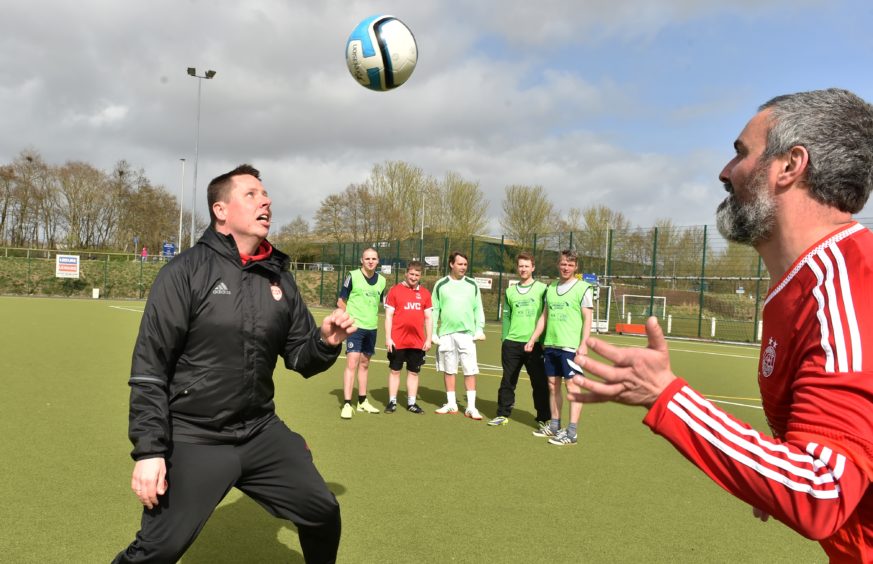

A new study has revealed the massive impact of football on the health of people across Scotland and on the nation’s economy.
The report, commissioned by UEFA, found that participation in the country’s favourite sport at a grassroots level adds £1.25 billion to Scotland’s coffers, including a £100 million boost to Aberdeen and Aberdeenshire.
The study suggests that the nation has saved £25 million in the treatment of cardiovascular disease, as the exercise keeps the heart healthy and cites a £10 million saving in preventing the onset of type-2 diabetes.
A £40 million saving in regard to mental health has been calculated nationally, with an estimated 5,000 cases prevented by people taking part in therapeutic games and training sessions.
An Aberdeen side, comprised of people with mental health conditions, yesterday explained how a love of the beautiful game had proven so healing for its players that it has helped them get back into work and reduced their hospital stays.
The group, Grampian Strikers, regularly meets for friendly kick-abouts and training sessions overseen by Aberdeen FC’s Community Trust group.
The Trust’s operations manager, Steven Sweeney, welcomed the findings of the UEFA report, which focused on Aberdeen and Aberdeenshire as a case study.
He said: “This demonstrates the true value of football participation and the impact it has within local communities.
“We feel that football clubs have a significant part to play in improving public health, contributing to the local economy and using sport and physical activity for social change.”
And Mr Sweeney highlighted the work it performs in partnership with Inverurie Locos and Peterhead, which “allow these benefits to ripple further across the region.”
The report outlines a direct economic of more than £29 million in the north-east, with a preventative health spend of more than £70 million from the non-professional game.
The region is reported to benefit from 1,300 jobs thanks to football, has volunteering roles with a benefit of £12 million and saves the NHS £4.5 million in mental health provision.
Aberdeen North MP, Kirsty Blackman, said: “Getting active is particularly important for people who are battling mental health problems and I can’t imagine a better way to encourage this than football games, coaching and skills.”
The report explained that grassroots football across Scotland has a “direct economic impact” of more than £200 million, creates £300 million in social benefits and is responsible for preventing almost £700 million in health spending.
The game is also credited reducing crime among young people, saving £65,000 in the north-east.
SFA chief executive, Ian Maxwell, said the report offered proof of football’s ability to “make society a better place”.
Grampian Strikers show the healing power of football
The positive effect of football on the physical health of players is widely known, and has been linked with preventing heart disease and diabetes.
But it is the beautiful game’s ability to transform people’s mental health which Grampian Strikers is most enthusiastic about.
Community psychiatric nurse, Russell Brimklow, formed the team in 2002 and since then it has fielded scores of players with conditions like schizophrenia, depression and bipolar disorder.
Mr Brimklow yesterday explained the astounding impact that the sport has had.
He said: “Young guys newly diagnosed with schizophrenia and conditions like that can find themselves distanced from society, and not exercising or doing the things they used to.
“I thought there was no better way of engaging with these guys than to have a game of football.
“The exercise is healthy, it gives them a chance to forget their problems and they have a chance to talk about things afterwards and get to know each other.
“People have become physically fitter by stopping smoking and starting to manage their alcohol or drug use because they want to play football.
“And we continue to engage with people if they are staying in hospital, and find that can help reduce the length of their stays.
“We have also noticed players finding their way back into work, or study, after spending time with the team.”
Grampian Strikers was initially run by NHS Grampian and Aberdeenshire Council staff but the training sessions, at Aberdeen Sports Village, were taken over by Aberdeen FC Community Trust in 2013.
The sessions are open to people aged from 18 to 65, and the side competes in a national mental health league.
Mr Brimklow said that past players still turn out to support the team, under the motto of “once a striker, always a striker”.

Be the first to comment